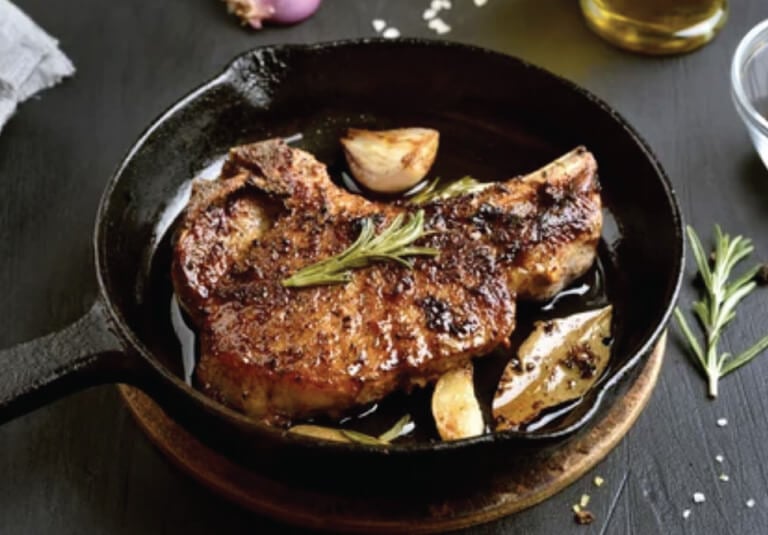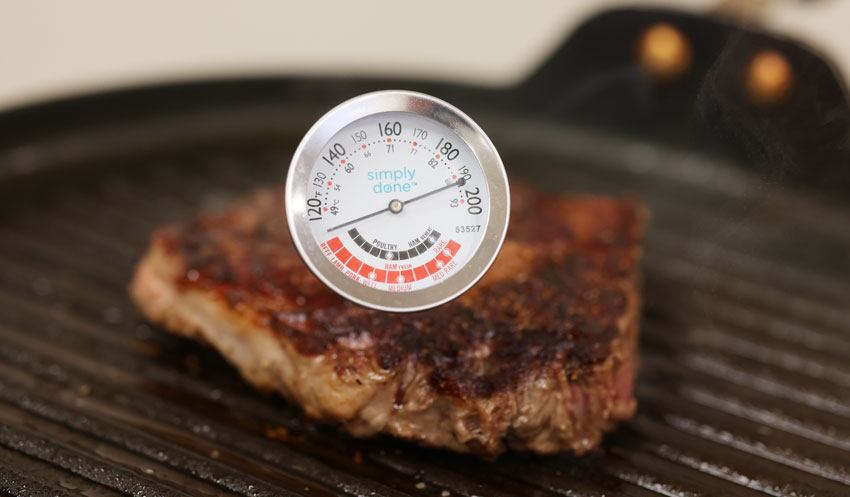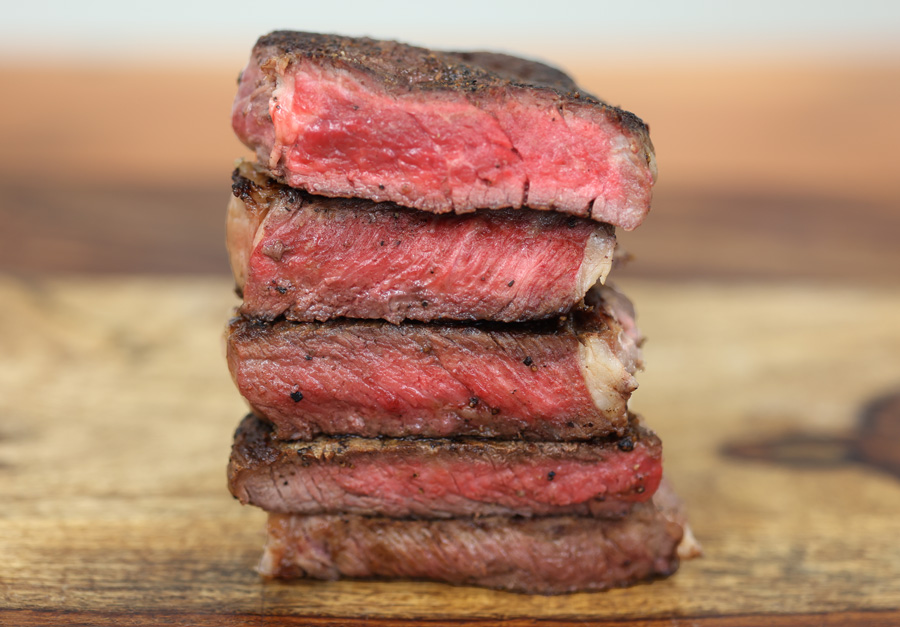How To Pan Sear Ribeye Steaks to Perfection

Table of Contents for How to Cook Steak
How to Cook the Best Steaks for grilling or pan roasting
1. Select the right cut of steak: The best fine dining steak cuts for grilling or pan roasting a steak come from a cut of beef that are rested on the cow since those will be the most tender with better marbling. This includes ribeye steaks, fillets, and New York Strip steaks. There are others like skirt steaks or flank steaks. What you are not looking for are some of the larger chunks of meat that get a lot of exercise on the cow like chuck roast which are best for braising.
2. Season the steak correctly: Season the steak ahead of time, at least 30 minutes to let the salt soak in.
Ribeye Steak Recipe Tools Needed
Heavy cast iron or carbon steel pan*
Measuring cups
Mixing bowl
Instant read thermometer
Spoon
Ribeye Steak Recipe Ingredients and Spices
Ribeye Steak
Avocado Oil
Butter – half a stick cubed
Steak Seasoning – 1/4 Cup Montreal Seasoning
Kosher Salt – 1/4 Cup
Thyme – 1 tbsp
Cooking Video of How to Pan Searing Ribeye Steak to Perfection
In this video, Chef Justin goes over how to pan sear ribeye steak to perfection. If you prefer to have the written version of how to pan sear steak to perfection please see the next section.
Pan Searing Ribeye Steak Recipe Cooking Instructions
Portion your ribeye steaks from the whole ribeye roll or trim off the Ribeye steak tail if your butcher did not already do this for you.
Make sure you generously add salt to both sides of the ribeye steak.
Allow the meat to rest for 20 minutes.
Add the Montreal steak seasoning to both sides of the steak.
Using a nice, thick pan made of cast iron or carbon steel place it over the stove and allow for the pan to get hot.
Wait until you see a little smoke or the heat coming off your pan.
Add a high smoke point oil – like avocado oil to your pan.
Drop your ribeye steak down on the pan and ensure there is full contact with the surface. Make sure there is a little oil underneath the ribeye steak when you cook it. You should be able to hear the sizzle as you lay the steak in the hot pan.

Place Your Ribeye Steak on Hot Pan.
You will see the color start to change. When it gets a little gray on the side half way up you can check the bottom for a little bit of color. Press down the meat using a spatula or block so it won’t wilt. Press down just enough to make sure it makes contact with the pan but don’t let juices out.
Flip the ribeye steak with Montreal seasoning and allow it to keep searing on the other side.

Flip Your Ribeye Steak To Sear The Other Side
Temp the steak using a meat thermometer to your desired meat doneness level. Remember to pull your steak a little before it reaches internal temperature. For example, for medium rare turn the flame off 120 mark when your target is 125

Use Thermometer to See Temperature of Steak.
Now, add some butter to the pan with fresh thyme. Allow it to melt and spoon it over the steak. This will give the meat some tremendous aromatics.
Let the steak rest for 10 minutes. This allows for the juices to reabsorb into the meat so your meat stays juicy!

Allow the steak to rest to .
Prepare the Ribeye Steak to be Cooked
Cook the Steak
Once the steak is cooked allow it to rest before serving with some compound butter for a classic steakhouse flavor.

Allow the steak to rest to .
You can also serve this steakhouse steak with chimichurri steak sauce and side of cauliflower mash or a mixed greens salad.
Internal Steak Temperature Cooking Table
What internal temperature should steak be cooked to? Use an instant read thermometer to check the temperature of your steak. Here is a picture of ribeye steaks sliced and stacked with rare at the top and well done at the bottom.

Steaks sliced stacked from rare at the top to well done at the bottom
Rare 115-120 degrees
Medium rare 125-130 degrees
Medium done 130-135 degrees
Mid well 140-145 degrees
Well done 150 – charcoal
*Note: Carbon steal steak pans are a little bit lighter than cast iron while having a great thermal mass that can add a wonderful sear to your steak. Try to stay away from the aluminum pans since they don’t keep enough heat. The pan is critical for the nice crust and sear.